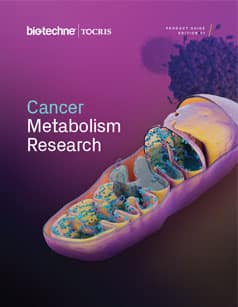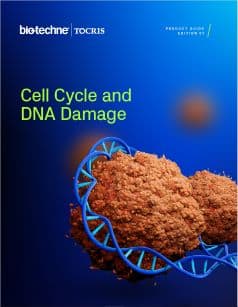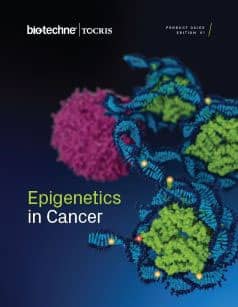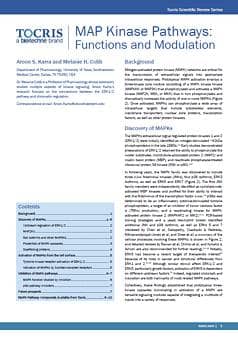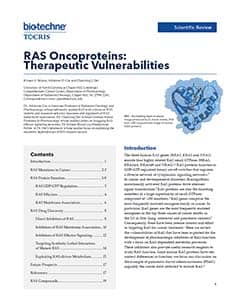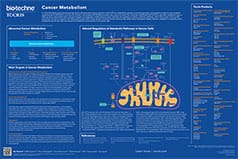Cancer Research
Cancer is a term used to define a group of diseases in which abnormal cells divide without control, are able to invade neighboring tissues/organs and metastasize. Cancer has been characterized by six hallmarks; self sufficiency in proliferative growth signals, insensitivity to growth inhibitors, evasion of apoptosis, limitless replicative potential, ability to develop blood vessels (angiogenesis), and tissue invasion and metastasis.
Cancers are often named after the organ in which they are first detected - the primary tumor site. Each primary tumor site has characteristic features and markers that can be targeted in research. For more information about each cancer type by primary tumor site see the Cancer Disease Product Areas below.
Cancer Disease Product Areas
Cancer Research Product Areas
Cancer Classification
There are more than 100 different types of human cancer. As well as being named after the organ or type of cell in which they start, cancer types can also be grouped into broad categories, the five main ones being:
- Carcinoma - cancer that begins in the skin or in tissues that line internal organs.
- Sarcoma - cancer that begins in connective or supportive tissue (bone, cartilage, muscle).
- Leukemia - cancer that starts in blood-forming tissue such as the bone marrow. Abnormal blood cells are produced which enter the bloodstream.
- Lymphoma and myeloma - cancers that begin in the immune system.
- CNS cancers - cancers that begin in the tissues of the brain and spinal cord.
Therapeutics
Owing to the prevalence of cancer within the population, investigation of potential therapeutic targets is the focus of intense research. Current therapeutic research is focusing on identifying new cellular targets for intervention, developing drugs based on small molecules, antibodies or nucleic acids. New drugs specifically targeting intracellular kinases, growth factor receptors or the proteasome are beginning to be used as frontline therapies, often in combination with established chemotherapeutic agents.
Literature for Cancer Research
Tocris offers the following scientific literature for Cancer Research to showcase our products. We invite you to request* or download your copy today!
*Please note that Tocris will only send literature to established scientific business / institute addresses.
Angiogenesis in Cancer Research Product Guide
This product guide provides background information on angiogenesis in cancer and lists around 150 products for the study of the main angiogenesis therapeutic targets including:
- Growth Factors
- Transcription Factors
- Adhesion, Extracellular Matrix Remodeling
- Key Signaling Pathways
Cancer Metabolism Research Product Guide
This product guide reviews some of the main areas in cancer metabolism research and lists around 150 products that can be used to investigate metabolic pathways in cancer including:
- Glycolysis
- Tricarboxylic Acid Cycle
- Lipidogenesis
- 1C Metabolism and Nucleic Acid Synthesis
- Drivers of Metabolic Reprogramming
- pH and Redox Balance
Cell Cycle and DNA Damage Research Product Guide
This product guide provides a review of the cell cycle and DNA damage research area and lists over 150 products, including research tools for:
- Cell Cycle and Mitosis
- DNA Damage Repair
- Targeted Protein Degradation
- Ubiquitin Proteasome Pathway
- Chemotherapy Targets
MAPK Signaling Scientific Review
MAP kinase signaling is integral to the regulation of numerous cellular processes such as proliferation and differentiation, and as a result is an important focus of cancer and immunology research. Updated for 2016, this review discusses the regulation of the MAPK pathway and properties of MAPK cascades. Compounds available from Tocris are listed.
RAS Oncoproteins Scientific Review
Written by Kirsten L. Bryant, Adrienne D. Cox and Channing J. Der, this review provides a comprehensive overview of RAS protein function and RAS mutations in cancer. Key signaling pathways are highlighted and therapeutic vulnerabilities are explored. This review also includes a detailed section on RAS drug discovery and targeting synthetic lethal interactors of mutant RAS. Compounds available from Tocris are listed.
Cancer Metabolism Poster
This poster summarizes the main metabolic pathways in cancer cells and highlights potential targets for cancer therapeutics. Genetic changes and epigenetic modifications in cancer cells alter the regulation of cellular metabolic pathways providing potential cancer therapeutic targets.
Cell Cycle & DNA Damage Repair Poster
In normal cells, each stage of the cell cycle is tightly regulated, however in cancer cells many genes and proteins that are involved in the regulation of the cell cycle are mutated or over expressed. This poster summarizes the stages of the cell cycle and DNA repair. It also highlights strategies for enhancing replicative stress in cancer cells to force mitotic catastrophe and cell death.
Programmed Cell Death Poster
There are two currently recognized forms of programmed cell death: apoptosis and necroptosis. This poster summarizes the signaling pathways involved in apoptosis, necroptosis and cell survival following death receptor activation, and highlights the influence of the molecular switch, cFLIP, on cell fate.

